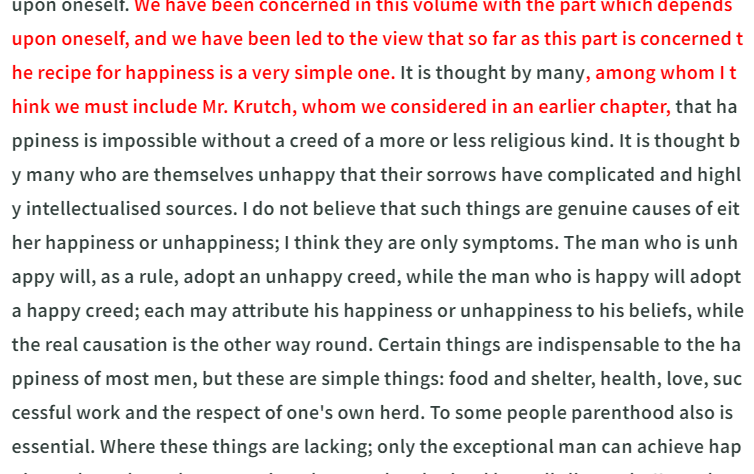出題にあたっての大学側の細かな配慮に気付いた話
2009年度の青山学院大学経済学部の入試問題において、英語の第1問の長文の出典が
「The Conquest of happiness」だった。
おおー、日本の高校英語の勉強で、ラッセルの「幸福論」が読めるのか!
ちょっと感心。
で、どの章が大学入試に引用されたのか気になったので、青学の出題本文と原文を比較したら、一部が問題用に改編されていた!
それを今回紹介しようと思う。
結論を先に言うと、「当たり前じゃん」と皆が思う、受験生への配慮があった。
「違うんじゃね?」という点があればご指摘ください。
- 出題にあたっての大学側の細かな配慮に気付いた話
- 出典元をさがす作業
- 「幸福論」のどこが入試で出されていたか
- 気になる違い2ヶ所
- まとめ・その他
- 【付録】出題された箇所の本文(原文ママ、色文字は入試問題で抜かれた箇所)
出典元をさがす作業
高校生の多くは、当然テストで点数を獲る練習をするのに集中して、問題集をこなしていく。
英語や国語で「これ面白い!」「続きが気になる」という文章に出会って、本をつい買っちゃいました、借りちゃいましたという経験をした人は多いはず。
事実、私も、私の友人もそうだった。
しかし、(自分で勉強できる賢い子というほんの一例を除き)思いの外「普通の=一般的な」イマドキの高校生はしなくなっているそうだ。
ちょっぴり悲しい。
出典が記載されていればそれをggればいいし、無ければ特徴的な単語や一節を検索にかければいいだけなのに。
ちょっと面倒だけど。
しかし、とある人にとっての当たり前は、他の誰かの当たり前ではないのだ。
だから、あえてちゃんとここに書いといた次第。
「幸福論」のどこが入試で出されていたか
partⅡ:The couses of happiness
Chapter17:The happy man
より。
気になる違い2ヶ所
細かくは5ヶ所、大きく分けると2ヶ所あった
その①
冒頭の文章から、色文字部分3ヶ所が入試では抜かれていた。
Happiness, as is evident, depends partly upon external circumstances and partly upon oneself. We have been concerned in this volume with the part which depends upon oneself, and we have been led to the view that so far as this part is concerned the recipe for happiness is a very simple one. It is thought by many, among whom I think we must include Mr. Krutch, whom we considered in an earlier chapter, that happiness is impossible without a creed of a more or less religious kind.
日本語で考えてみると、
幸福は、明らかなことであるが、一部には外部の環境に、一部には自分自身に依存している。本書では、自分自身に依存する部分について関心を持ってきた。そして、自分自身に依存する部分に関するかぎり、幸福の処方箋は実に単純であるという見解に至った。多くの人は、その中には、始めの方の章で考察したクラッチ氏もあげなければならないが、多少とも宗教的な信条なしには幸福はありえないと考えている。
なるほど、初見でも違和感がなく、話をここから読み進めても大丈夫なように、余計な部分をカットしている。
いきなり「クラッチ氏」と言われても、ワケわからないしね。
知的好奇心が旺盛で、「幸福論」は既読ですという高校生(受験生)がいたとしても、わからない人が一人でもいる(可能性がある)以上、それは前提が不平等で、不適切な試験だからね。
スタートラインを平等にするための体裁調整。
↓スッキリver.
Happiness depends partly upon external circumstances and partly upon oneself. It is thought by many that happiness is impossible without a creed of a more or less religious kind.
幸福は、一部には外部の環境に、一部には自分自身に依存している。多くの人は、多少とも宗教的な信条なしには幸福はありえないと考えている。
その②
第2段落目の最終文より、色文字部分2ヶ所が抜かれていた。
It is a grave defect in certain forms of traditional religion that they have encouraged this particular kind of self-absorption.
日本語で考えると、
このような特殊な類の自己陶酔を奨励してきたのは、一部の伝統的宗教の重大な欠点である。
前後の文脈をとらないと少しわかりにくいかもしれないが、受験生や世間の目から【宗教批判】ととられかねないから削除したのだろうか。
以上の2点が変更された点だった。
まとめ・その他
逆に言うとその2ヶ所以外は本文のまま出題されていたので、受験生は是非チャレンジしてみては!?
「和訳」「語彙選択」「空所補充」「内容一致」という具合に、比較的バランスのいい設問になっている。
単語力も鍛えられそう。
【付録】出題された箇所の本文(原文ママ、色文字は入試問題で抜かれた箇所)
Happiness, as is evident, depends partly upon external circumstances and partly upon oneself. We have been concerned in this volume with the part which depends upon oneself, and we have been led to the view that so far as this part is concerned the recipe for happiness is a very simple one. It is thought by many, among whom I think we must include Mr. Krutch, whom we considered in an earlier chapter, that happiness is impossible without a creed of a more or less religious kind. It is thought by many who are themselves unhappy that their sorrows have complicated and highly intellectualised sources. I do not believe that such things are genuine causes of either happiness or unhappiness; I think they are only symptoms. The man who is unhappy will, as a rule, adopt an unhappy creed, while the man who is happy will adopt a happy creed; each may attribute his happiness or unhappiness to his beliefs, while the real causation is the other way round. Certain things are indispensable to the happiness of most men, but these are simple things: food and shelter, health, love, successful work and the respect of one's own herd. To some people parenthood also is essential. Where these things are lacking; only the exceptional man can achieve happiness, but where they are enjoyed, or can be obtained by well-directed effort, the man who is still unhappy is suffering from some psychological maladjustment which, if it is very grave, may need the services of a psychiatrist, but can in ordinary cases be cured by the patient himself, provided he sets about the matter in the right way. Where outward circumstances are not definitely unfortunate, a man should be able to achieve happiness, provided that his passions and interests are directed outward, not inward. It should be our endeavour therefore, both in education and in attempts to adjust ourselves to the world, to aim at avoiding self-centred passions and at acquiring those affections and those interests which will prevent our thoughts from dwelling perpetually upon ourselves. It is not the nature of most men to be happy in a prison, and the passions which shut us up in ourselves constitute one of the worst kinds of prisons. Among such passions some of the commonest are fear, envy, the sense of sin, self-pity and self-admiration. In all these our desires are centred upon ourselves: there is no genuine interest in the outer world, but only a concern lest it should in some way injure us or fail to feed our ego. Fear is the principal reason why men are so unwilling to admit facts and so anxious to wrap themselves round in a warm garment of myth. But the thorns tear the warm garment and the cold blasts penetrate through the rents, and the man who has become accustomed to its warmth suffers far more from these blasts than a man who has hardened himself to them from the first. Moreover, those who deceive themselves generally know at bottom that they are doing so, and live in a state of apprehension lest some untoward event should force unwelcome realisations upon them.
One of the great drawbacks to self-centred passions is that they afford so little variety in life. The man who loves only himself cannot, it is true, be accused of promiscuity in his affections, but he is bound in the end to suffer intolerable boredom from the invariable sameness of the object of his devotion. The man who suffers from a sense of sin is suffering from a particular kind of self-love. In all this vast universe the thing that appears to him of most importance is that he himself should be virtuous. It is a grave defect in certain forms of traditional religion that they have encouraged this particular kind of self-absorption.
The happy man is the man who lives objectively, who has free affections and wide interests, who secures his happiness through these interests and affections and through the fact that they, in turn, make him an object of interest and affection to many others. To be the recipient of affection is a potent cause of happiness, but the man who demands affection is not the man upon whom it is bestowed. The man who receives affection is, speaking broadly, the man who gives it. But it is useless to attempt to give it as a calculation, in the way in which one might lend money at interest, for a calculated affection is not genuine and is not felt to be so by the recipient.
以下サムネ用の粗い画像

*1:The Conquest of Happiness by Bertrand Russel, Taylor & Francis